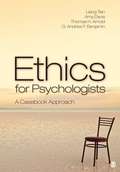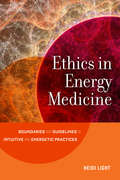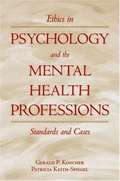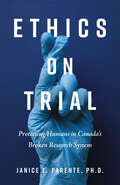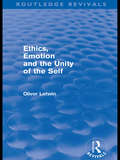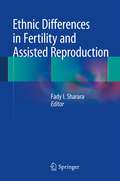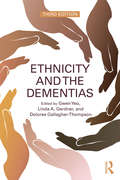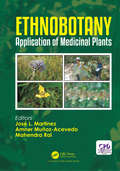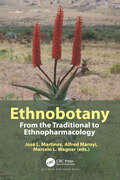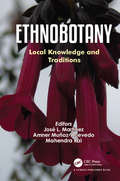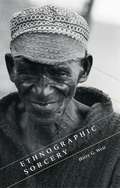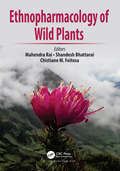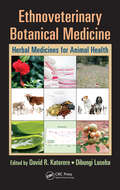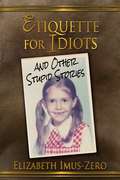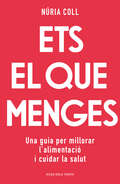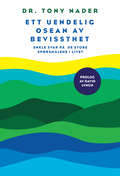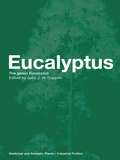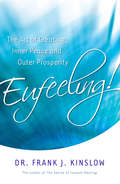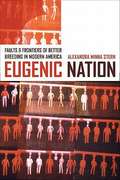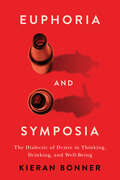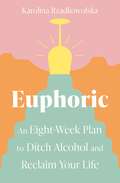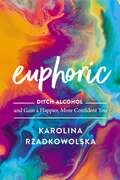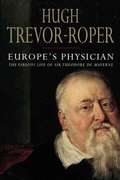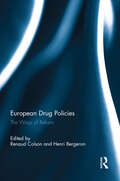- Table View
- List View
Ethics for Psychologists: A Casebook Approach
by Liang Tien Amy Davis Thomas H. Arnold Andrew F. BenjaminEthics for Psychologists provides unique multicultural, moral, and legal perspectives to the standards of conduct in the field of psychology. The book describes complex ethical dilemmas students may encounter and offers a variety of frameworks through which to examine such dilemmas.
Ethics in Energy Medicine: Boundaries and Guidelines for Intuitive and Energetic Practices
by Heidi LightThe first guidebook to discuss the full scope of the intuitive process and propose structures to keep practitioners and clients safeHeidi Light, a family counselor and certified hypnotherapist, asserts that we are in desperate need of guidance and standards so that we can approach the world of intuition, energy, and mysticism from a healthy and respectful place. Drawing from her more than forty years as a medical intuitive, empath, and energy tracker—as well as twenty years as a counselor in private, clinical, and institutional settings—Light offers practical, simple solutions to the alarming lack of boundaries in the fields of intuition and energy medicine. From massage therapists who just throw in a little extra energy work, to psychics who read your sister instead of you, or to practitioners who tell you to take off your clothes, Light shares case studies and vignettes of ethical boundaries mistakenly being crossed. This book explains the traditional psychological model of ethics that counselors and psychologists are taught and outlines an ethical energetics model as a framework for moving through the process of accessing intuitive information and working with energy. Experienced energy workers, those new to the field and just opening to their intuition, and those who come to them for services need to know these ethical guidelines of boundaries and consent.
Ethics in Psychology and the Mental Health Professions: Standards and Cases (3rd edition)
by Patricia Keith-Spiegel Gerald P. KoocherWe seek to present the full range of contemporary ethical issues in the mental health professions, not only as relevant and intriguing but also as integral and unavoidable aspects of the our complex professional roles and social responsibilities. Regardless of one's training speciality or the work setting, critical dilemmas will arise -- probably with some regularity--and we will often need to make challenging decisions or take intervention steps, sometimes right on the spot.
Ethics on Trial: Protecting Humans in Canada's Broken Research System
by Janice E. ParenteExposing the human consequences of Canada’s broken research system. The governance framework for human research in Canada is dangerously flawed and has the potential to lead to harm and suffering. Canadian researchers and research companies have been allowed to flirt with informed consent; “forum shop” for less restrictive ethical oversight; and violate the rights, safety, and welfare of Canadians — including those in situations of vulnerability — under the indifferent eye of a federal government unwilling to fix the system.In Ethics on Trial, Janice E. Parente — who has led the fight for oversight and accountability of human research in Canada for three decades — shows readers the devastating consequences of the current flawed approach. She proposes a simple solution that embraces a good and ethical system of governance — a system that Canadians should insist on and Canada’s lawmakers and research funders should wholeheartedly adopt.
Ethics, Emotion and the Unity of the Self (Routledge Revivals)
by Oliver LetwinThis Routledge Revival reissues Oliver Letwin’s philosophical treatise: Ethics, Emotion and the Unity of the Self, first published in 1987, which concerns the applicability of the artistic classifications of romanticism and classicism to philosophical doctrine. Dr Letwin examines three particular theses associated with philosophical romanticism: that there is within us a high self and a low self; that there is a moral self in inevitable conflict with an amoral self; and that there is a rational self disjoined from and in tension with a passionate self. He argues that these notions of philosophical romanticism are, in fact, radically false, and instead takes the view that man can be a unified being of the sort described by philosophical classicists. But man has to work to achieve this status. The intrinsic unity of the human personality is not a guarantee of a coherent life, but a challenge to be met.
Ethnic Differences in Fertility and Assisted Reproduction
by Fady I. ShararaOver the past 10 years, studies have shown that the rates of fertility vary in different ethnic groups. Ethnic differences also play a significant role in the outcome of assisted reproductive technology (ART) cycles. In the United States, minority groups--African Americans, Hispanics (mainly Mexicans and Central Americans), East Asians (Chinese, Japanese, Koreans, Philippinos) and South Asians (Indians, Pakistanis, and Bengalis)--have significantly lower chances of live births compared to Caucasian women. Birth outcome data collected by the Society for Assisted Reproductive Technology shows a worsening trend in conception rates between the years 1999-2000 and 2004-2006, raising more concern that the disparity in fertility rates between minority groups and white women is widening over time. This comprehensive book serves to answer the questions that arise when managing infertility in a multi-ethnic population. An expert assembly of key leaders in the field of reproductive medicine imparts insight and clinical experience in order to identify and analyze the possible causes of racial disparities in fertility outcome. Some of the reviewed causes include higher Body Mass Index (BMI), tubal diseases, metabolic syndrome, and fibroids in African Americans; tubal disease and higher early pregnancy loss in Hispanics; higher incidence of diminished ovarian reserve and lower BMI in East Asians; and higher incidence of polycystic ovarian disease (PCOS) in South Asians. The book also provides a review of data on access to care and ART services in developing countries. A thoughtful combination of evidence-based medicine and advanced treatment options, this book is sure to distinguish itself as the definitive reference on ethnic differences in assisted reproduction.
Ethnicity and the Dementias (Third Edition)
by Gwen Yeo Linda A. Gerdner Dolores Gallagher-Thompson<p>In recent years, the literature on the topic of ethnic and racial issues in Alzheimer’s disease and other dementias has increased dramatically. At the same time, the need for cultural competence in all of geriatric care, including dementia care, is increasingly being acknowledged. Dementia is a large societal problem affecting all communities, regardless of race or ethnicity, and understanding dementia for specific groups is tremendously important for both clinical knowledge and for health planning as a nation. <p>This third edition of Ethnicity and the Dementias offers invaluable background information in this area, while also examining how those suffering from dementia and their family members respond or adapt to the challenges that follow. Thoroughly updated and revised throughout, the book features contributions from leading clinicians and researchers in the field, with particular attention given to genetic and cultural factors related to dementia, effective prevention and treatment strategies, and issues in caregiving and family support. Chapters offer specific recommendations for dementia care in 11 ethnic/racial groups, as well as suggestions for working effectively with LGBTQ+ families. <p>Providing a truly comprehensive resource on ethnicity and dementia, and including reflections on emerging trends and the future of caregiving, this new edition is ideal reading for clinicians, educators, researchers, policy makers, and families, in search of the most current ethnogeriatric findings.</p>
Ethnobotany: Application of Medicinal Plants
by Mahendra Rai José L. Martinez Amner Muñoz-AcevedoEthnobotany includes the traditional use of plants in different fields like medicine and agriculture. This book incorporates important studies based on ethnobotany of different geographic zones. The book covers medicinaland aromatic plants, ethnopharmacology, bioactive molecules, plants used in cancer, hypertension, disorders of the central nervous system, and also as antipsoriatic, antibacterial, antioxidant, antiurolithiatic. The book will be useful for a diverse group of readers including plant scientists, pharmacologists, clinicians, herbalists, natural therapy experts, chemists, microbiologists, NGOs and those who are interested in traditional therapies.
Ethnobotany: From the Traditional to Ethnopharmacology
by José L. Martinez Alfred Maroyi Marcelo L. WagnerIn this book we present recent studies that have been carried out on some widely used medicinal plants. The need for new and alternative treatments stem from the lack of efficiency of existing remedies for certain illnesses. We have compiled information that may be useful to researchers in their quest to develop new drugs.
Ethnobotany: Local Knowledge and Traditions
by Mahendra Rai Jose L. Martinez Amner Munoz-AcevedoEthnobotany: Local Knowledge and Traditions discusses various plants that have actually been used in traditional medicine for a specific ailment. It desribes the biological effectiveness (activities) related to each "sickness" which have been scientifically verified. This book will also discuss the bioactivities established/determined that are promising and have potential. Finally, this book will be an appropriate consultation tool for scientists/professionals/experts such as ethnobotanists, botanists, cell/molecular biologists, chemists, pharmacists, pharmacologists, environmentalists/ecologists.
Ethnographic Sorcery
by Harry G. WestAccording to the people of the Mueda plateau in northern Mozambique, sorcerers remake the world by asserting the authority of their own imaginative visions of it. While conducting research among these Muedans, anthropologist Harry G. West made a revealing discovery---for many of them, West's efforts to elaborate an ethnographic vision of their world was itself a form of sorcery. In Ethnographic Sorcery, West explores the fascinating issues provoked by this equation. A key theme of West's research into sorcery is that one sorcerer's claims can be challenged or reversed by other sorcerers. After West's attempt to construct a metaphorical interpretation of Muedan assertions that the lions prowling their villages are fabricated by sorcerers is disputed by his Muedan research collaborators, West realized that ethnography and sorcery indeed have much in common. Rather than abandoning ethnography, West draws inspiration from this connection, arguing that anthropologists, along with the people they study, can scarcely avoid interpreting the world they inhabit, and that we are all, inescapably, ethnographic sorcerers.
Ethnopharmacology of Wild Plants
by Mahendra Rai; Shandesh Bhattarai; Chistiane M. FeitosaThe book provides valuable information on wild plants and their ethnopharmacological properties, discussion on ethnobotany, phytotherapy, diversity, chemical and pharmacological properties including antifungal, anti-inflammatory and antiprotozal properties. The chapters include a wide range of case studies, giving updated evidence on importance of wild plant resources from different countries including Nepal, India, Brazil, Chile, Argentina, Colombia, Egypt, Peru, etc. In addition, some specific species are used to explain their potential properties. Discussing traditional usage and pharmacological properties of wild plants, this book is entirely different from other related publications and useful for the researchers working in the areas of conservation biology, botany, ethnobiology, ethnopharmacology, policy making, etc.
Ethnoveterinary Botanical Medicine: Herbal Medicines for Animal Health
by David R. Katerere Dibungi LusebaDespite the undoubted success of a scientific approach to pharmaceuticals, the last few decades have witnessed a spectacular rise in interest in herbal medicinal products. This general interest has been followed by increasing scientific and commercial attention that led to the coining of the term ethnopharmacology to describe the scientific discipl
Etiquette For Idiots: And Other Stupid Stories
by Elizabeth Imus-ZeroIf your name is Don Imus, then hi Dad! Sorry about the stuff I wrote about you. I know you asked me not to write about you but to instead write about me. I’d like to point out that this book is about me, you just happen to be my father and since you stuck around...some of MY stories include you. Shitty luck, right? Anyway, get over it and toughen up. That’s what you always tell me to do. Besides, most of this book is about idiots and morons and how I think they should behave. So don’t worry, it’s not like I accused you of having sex with the dog or beating the cat with a wire hanger...but if I’m left out of your will, I may write a second book. xo love, your wonderful daughter, Elizabeth If you’re anyone else and you picked up this book because of its catchy title, then it’s because you have terrible manners and you are acting like an idiot, or you know someone who is and you need to buy this book for them. Whatever the deal is, enjoy. xo ez
Ets el que menges: Una guia per millorar l'alimentació i cuidar la salut
by Núria CollLa periodista i divulgadora de temes de salut més reconeguda del nostre país ens explica tot allò que sap sobre nutrició i vida sana. Uneix-te als milers de seguidors de la revolució saludable amb els consells de Núria Coll. Menjar saludable no és difícil, però de vegades ens perdem entre tantes dades i dietes de moda. No cal aprendre cada nou estudi nutricional; probablement ens serviria més aturar-nos i pensar una mica. En aquest llibre de reflexions i consells la periodista especialitzada en alimentació saludable, Núria Coll, amb idees i pensaments basats en el sentit comú, ens proposa un objectiu clar: despertar al lector l'ambició de tenir un criteri propi perquè no depengui del que és que els gurus diuen que cal menjar. Aquest llibre t'empoderarà per trobar el teu propi camí en la teva alimentació. «Quan al 2014 vaig començar en la divulgació de l'alimentació saludable, no tenia gaire coneixements, però en poc temps em vaig adonar que, de manera urgent, havíem d'evitar molts dels pots i paquets que omplen els nostres rebosts. En qüestió de setmanes vaig canviar els meus hàbits alimentaris de forma radical, vaig començar a menjar saludable i vaig aprendre una cosa crucial: l'important no era només què menjar, sinó com.»
Ett uendelig osean av bevissthet
by Dr. Tony NaderEnkle svar på de store spørsmålene i livet. Prolog av David Lynch. «I denne milepælen av en bok, tilbyr Dr. Nader ideer og tanker som kan forandre verden. Han gir solide løsninger på spørsmål som lenge har fascinert og begeistret filosofer og forskere og dekker mangfoldige områder som hensikten med livet, det gode og det onde, hva er bevissthet, har vi frihet? Finnes det lov og orden eller bare kaos i universet? Hvordan kan vi utjevne forskjeller mellom ateisten og den troende, determinisme og frie valg? Hvordan gjøre det beste utav livet, oppfylle ønsker og skape fred og harmoni mellom mennesker og nasjoner? Han tilbyr disse løsningene basert på et enkelt underliggende paradigme som forener sinn, kropp og miljø i et osean av ren Væren, ren Bevissthet. En bok man må lese hvis man søker svar på mysteriene i livet, den absolutte og ultimate sannhet.»David Lynch «Jeg ønsker at alle skal vite hva Bevissthet er og hvordan man kan utvikle det for å kunne utnytte sitt full potensial som individ og som aktiv deltaker sammen med andre.»Dr. Tony Nader
Eucalyptus: The Genus Eucalyptus
by John J. W. CoppenEucalyptus, a genus of over 800 species, is a multiproduct crop par excellence. Not only is it grown for timber, pulp and fuelwood, but, as the Aborigines discovered thousands of years ago, it has numerous medicinal and aromatic properties. Since the first commercial distillation of eucalyptus oil 150 years ago, a vast array of eucalyptus-based pro
Eufeeling!: The Art Of Creating Inner Peace And Outer Prosperity
by Frank J. KinslowWithin the pages of Dr. Kinslow’s new book you will learn to go beyond the instant healing power of Quantum Entrainment to, with a single procedure, realize your deepest spiritual and material goals. You will learn how to find your Eufeeling, the hub around which all the creative forces of nature revolve, then how to use it to form a powerful and immediately effective intention. Making the most abstract subjects easy to understand and practical to use, Dr. Kinslow shows the reader how to tap their natural harmonizing zones deep within their minds. He is the discoverer and developer of Quantum Entrainment, the ground-breaking healing technique that thousands around the globe have successfully used to eliminate emotional and physical discord in themselves and others. Now, in Eufeeling! Dr. Kinslow brings to bear that same easy style of coaching that was so successful in teaching you Quantum Entrainment. In Eufeeling! Dr. Kinslow introduces the reader to the QE Intention, a unique and practical tool that anyone can use to improve emotional and physical disharmony, unsettled relationships and financial difficulties, and even influence environmental stresses. QE Intention shows you how a simple shift in your awareness will organize the creative forces of nature in your favor as easily as iron filings align in the presence of a strong magnet. QE Intention can quickly satisfy even your deepest desires. Once initiated, QE Intention is effortless and extraordinarily effective. It uses the creative energy and harmony of Eufeeling as a spiritual launching pad to quickly accomplish material goals. If you are already doing intention work you will find that adding QE Intention to your practice will greatly accelerate the results you are already having. And what's more exciting, creating a QE Intention takes no special training or talent. If you are reading these words you have everything you need to create a QE Intention.
Eugene Braunwald and the Rise of Modern Medicine
by Thomas H. LeeSince the 1950s, the death rate from heart attacks has plunged from 35 percent to about 5 percent--and fatalistic attitudes toward this disease and many others have faded into history. Much of the improved survival and change in attitudes can be traced to the work of Eugene Braunwald, MD. In the 1960s, he proved that myocardial infarction was not a "bolt from the blue" but a dynamic process that plays out over hours and thus could be altered by treatment. By redirecting cardiology from passive, risk-averse observation to active intervention, he helped transform not just his own field but the culture of American medicine. Braunwald's personal story demonstrates how the forces of history affected the generation of researchers responsible for so many medical advances in the second half of the twentieth century. In 1938 Nazi occupiers forced his family to flee Vienna for Brooklyn. Because of Jewish quotas in medical schools, he was the last person admitted to his class, but went on to graduate number one. When the Doctor Draft threatened to interrupt his medical training during the Korean War, he joined the National Institutes of Health instead of the Navy, and there he began the research that made him the most influential cardiologist of his time. In Eugene Braunwald and the Rise of Modern Medicine, Thomas H. Lee offers insights that only authoritative firsthand interviews can provide, to bring us closer to this iconic figure in modern medicine.
Eugenic Nation: Faults and Frontiers of Better Breeding in Modern America
by Alexandra Minna SternMany people assume that eugenics all but disappeared with the fall of Nazism, but as this sweeping history demonstrates, the idea of better breeding had a wide and surprising reach in the United States throughout the twentieth century. With an original emphasis on the American West, Eugenic Nation brings to light many little-known facts--for example, that one-third of the involuntary sterilizations in this country occurred in California between 1909 and 1979--as it explores the influence of eugenics on phenomena as varied as race-based intelligence tests, school segregation, tropical medicine, the Border Patrol, and the environmental movement. Eugenic Nation begins in the 1900s, when influential California eugenicists molded an extensive agenda of better breeding for the rest of the country. The book traces hereditarian theories of sex and gender to the culture of conformity of the 1950s and moves to the 1960s, arguing that the liberation movements of that decade emerged in part as a challenge to policies and practices informed by eugenics.
Euphoria and Symposia: The Dialectic of Desire in Thinking, Drinking, and Well-Being
by Kieran BonnerEuphoria and Symposia explores the relationship between euphoria, desire, and well-being in the human practices of drinking and thinking, both phenomena in which seeking more – more alcohol, more knowledge – can be understood, ambiguously, as simultaneously positive and negative.Drinking leads to both euphoria and depression and is potentially destabilizing for both the individual and the collective. While medical science understands it is risky for our health (dependency, addiction, illness), anthropology sees drinking as contributing to communal celebration (euphoria, sociability). Since health and celebration are both desirable goods, Kieran Bonner suggests that it is this balancing act – our desire for what is better and good, our preference for one thing over another – that creates ambiguity, revealing a grey zone that is fundamental to a fuller understanding of well-being. In a series of case studies, revealing intricacies and ambiguities not usually picked up in typical scientific, philosophical, or sociological discourses, Bonner posits well-being as harmony, requiring nuanced judgments about the various things that humans desire, including wealth, health, beauty, power, vitality, leisure, pleasure, love, and wisdom.Informed by a creative synthesis of Socratic interrogation, hermeneutic perspectives drawn from post-phenomenological thinkers such as Hans-Georg Gadamer and Hannah Arendt, and distinctive perspectives found in the tradition of reflexive sociology, Euphoria and Symposia asserts that reconciling unlimited desire with the finite nature of the human condition is essential for the understanding and enjoyment of life itself.
Euphoric: An Eight-Week Plan to Ditch Alcohol and Reclaim Your Life
by Karolina RzadkowolskaEuphoric will guide you on your journey to an alcohol-free lifestyle, putting the focus on happiness, well-being and self-love to create the life you want.Breaking old habits is never easy, and when the temptation of alcohol is always present in your social life, it can be hard to make the change to go teetotal. But what if you found a new way to maximise the joy a drink can offer without the health implications?Certified alcohol-free life coach Karolina Rzadkowolska has helped thousands of casual drinkers transform their relationship with drinking. In Euphoric, she shares a proven, eight-week strategy to ditch alcohol and learn how to:· Create a natural buzz that alcohol can only mimic· Be fully present with your friends and family· Feel more energised, look better and live healthier· Enjoy the best sleep of your life· Have fun in any social situation without drinking· Accomplish new goals with your newfound driveReclaim yourself and rejuvenate your passions, as you make alcohol insignificant in your life and get motivated to chase your biggest dreams.
Euphoric: Ditch Alcohol and Gain a Happier, More Confident You
by Karolina RzadkowolskaEuphoric is your 8-week plan for an alcohol-free lifestyle that can lead to more happiness, well-being, and self-love. It&’s the modern woman&’s guide to relax without alcohol, find freedom from cravings and fitting in, and create the life you want--along with the audacity to go after it. Imagine a program that makes the benefits of &“Dry January&” last all year. That&’s Euphoric!Alcohol is everywhere in our society, and it&’s hard to resist. The pressures to fit in and have &“just one drink&”--that turns into several--whether at a party or on a casual Friday night, can lead to an imbalanced life that&’s plagued with unhealthy habits, low self-esteem, and decreased productivity.How can you change your relationship with alcohol without feeling deprived or like a social outcast? First, decide you want a change and then pick up Euphoric,from certified alcohol-free life coach Karolina Rzadkowolska.Karolina has helped thousands of casual drinkers transform their relationship with alcohol, including herself. In Euphoric, she shares a proven strategy to make alcohol insignificant in your life. In just eight weeks, you can ditch alcohol and learn how to:Create a natural buzz that alcohol can only mimicBe fully present with your kids, partner, and friendsFeel more energized, look better, and live healthierEnjoy the best sleep of your lifeHave fun in any social situation, without drinkingAccomplish goals with your newfound driveBecome confident to chase your biggest dreamsEuphoric presents an 8-week, easy-to-customize plan for anyone who wants to transform their relationship with alcohol and experience the life-changing benefits that happen when you take a break from booze to focus the health of your mind, body, and soul.Here&’s the plan!Week 1: Examine and Dismantle Limiting BeliefsWeek 2: Let Go of ShameWeek 3: Step into Your Best HealthWeek 4: Navigate Your Social LifeWeek 5: Get Mindful and Embody Self-LoveWeek 6: Find Pure and Utter HappinessWeek 7: Create Your Dream LifeWeek 8: Step into Your PurposeReclaim yourself and rejuvenate your life, as you make alcohol irrelevant and get motivated to claim a new lifestyle clearly focused on your goals, priority, and values.
Europe's Physician: The Life of Sir Theodore de Mayerne, 1573-1655
by Hugh Trevor-RoperThis book reveals the story of the pioneering Swiss Huguenot doctor who mixed medicine with diplomacy, with political intrigue, with secret intelligence, and with artistic interests at the courts first of Henry IV of France and then of James I and Charles I of England.
European Drug Policies: The Ways of Reform
by Renaud Colson Henri BergeronThe drug control regime established by the international community has not succeeded in curbing either the demand for, or the offer of, narcotics. But, despite a series of developments in the Americas – including the legalisation of cannabis in Uruguay and in several states in the United States of America – there is still little support in Europe for repealing drug-prohibition laws. Nevertheless, a gradual policy convergence reveals the emergence of a European model favouring public-health strategies over a strictly penal approach to combatting drugs, while growing transnational support for legalisation indicates the persistence of an alternative paradigm for drug policy. This book examines the various influences on drug policies in Europe, as grassroots movements, NGO networks, private foundations and academic research centres increasingly confront the prevailing discourses of drug prohibition. Pursuing an interdisciplinary approach and bringing together legal scholars, social scientists and practitioners, it provides a comprehensive and critical assessment of drug policy reform in Europe.
